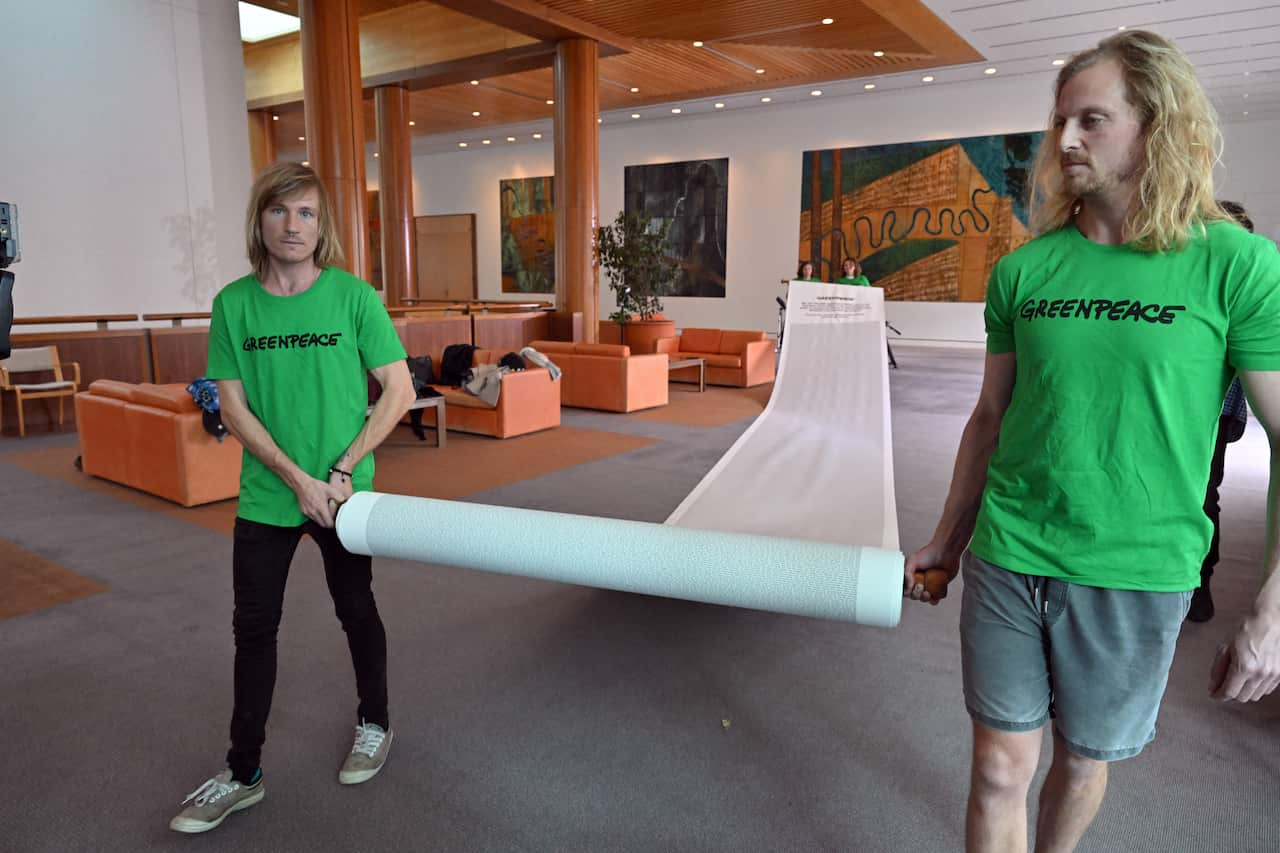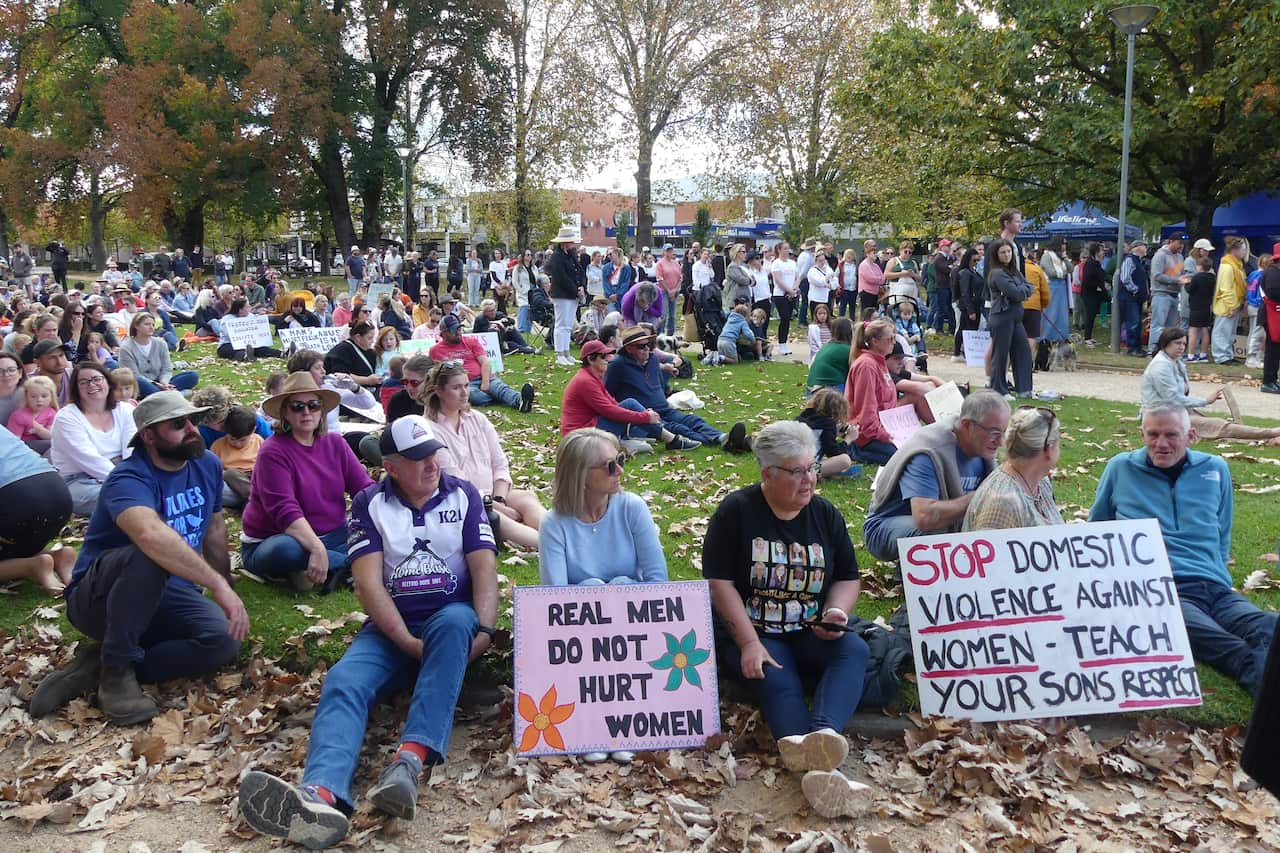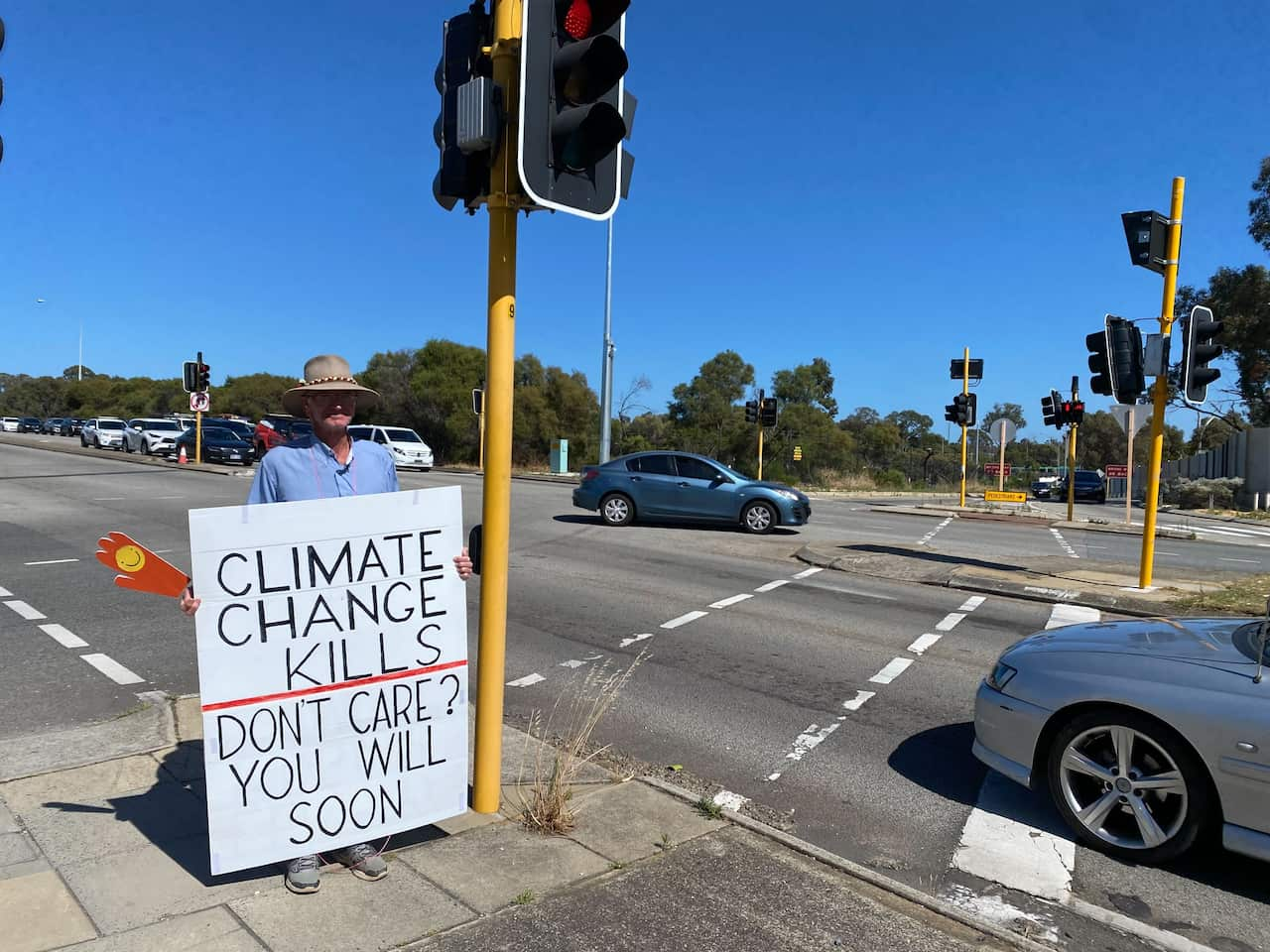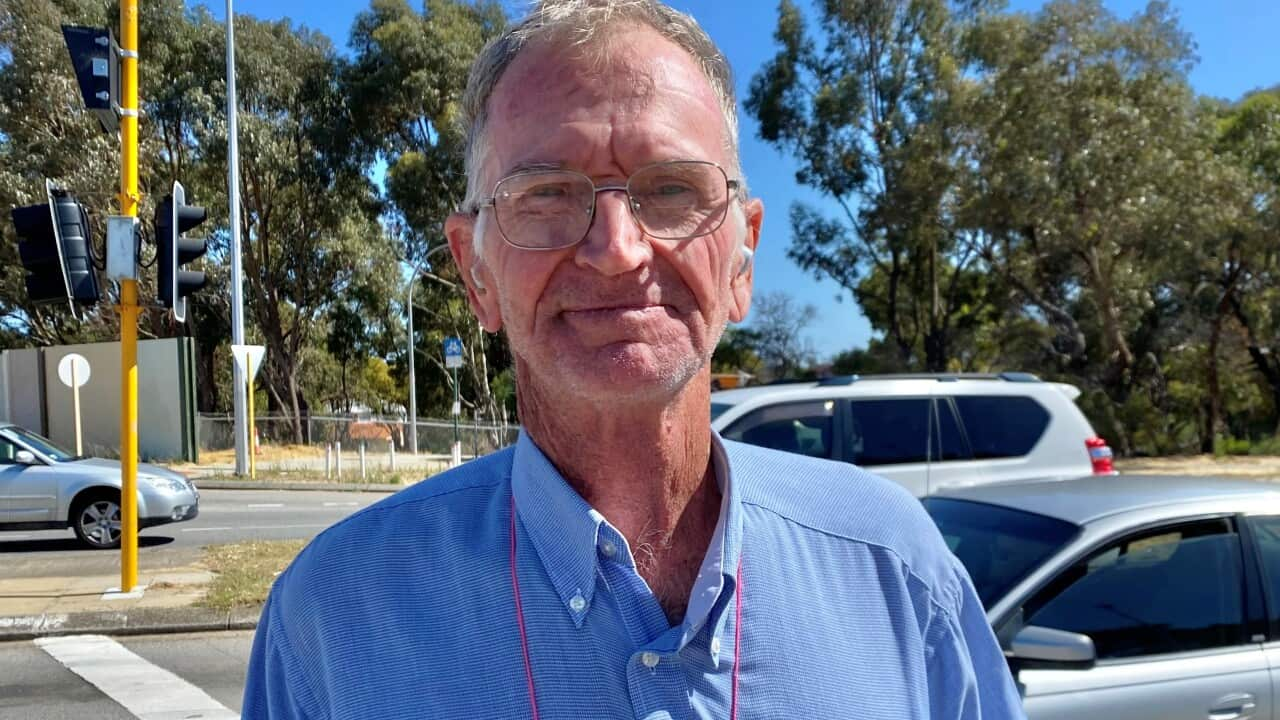Key Points
- 71-year-old Ian Kruger has spent hundreds of hours holding signs about climate change by a local road.
- His solo protest takes place on weekdays during peak hour and he wants people to consider the impact of climate change.
- Seven in 10 Australians support federal legislation to protect the right to peaceful protest, according to a survey.
Ian Kruger could be enjoying some leisure time in his retirement, but instead, the 71-year-old spends weekday mornings holding up a large sign by the side of the road.
He wants to see more action taken to address and has chosen to peacefully protest by himself at a busy intersection in suburban Perth.
While there may not be a lot of solo septuagenarians protesting on such a regular basis, new data has revealed most Australians support the right to peacefully protest, as Kruger does.
A one-man protest
For about an hour during peak hour morning traffic, or closer to 90 minutes if his back is not giving him trouble, Kruger stands along a main arterial road in the northern suburb of Perth with a handwritten sign.
He has been doing this for about a year.
Kruger is not asking anyone to sign up to anything, to donate or send a letter to their local member, in fact he is not asking anyone to take any one specific action.
Instead, he just hopes to prompt people to think about .
Kruger’s protest is not a group action but a solo pursuit.
“It’s just to try to get people to think,” he said.
He said he had started to attend climate rallies and protests in about 2019.
“I always believed what I read about climate change, but it was not immediate, whereas now, it’s immediate.
“I used to look at it and say, oh, the impacts of it will be seen after I’m dead.”
The latest State of the Climate report since national records began in 1902.
“We say okay, we’ll probably handle 1.5 degrees, it’s not so bad, but then you see what 1.5 degrees means, and ” Kruger said.
“You see all the trees that died off [in Perth and the south-west of WA] last year, and we’ve known for a long time the rain is reducing here.”
Members of groups such as Greenpeace work together to plan protests that will garner public and media attention. Source: AAP / Mick Tsikas
Perth recently experienced its driest six months on record, and in February 2024, large areas of vegetation started to turn brown and die off in response to the cumulative stress of the conditions, which scientists have likened to a coral bleaching event on land.
Other parts of the world are also experiencing extreme weather events.
“My wife, she is Thai, and where she is from, people are dying from heat now,” Kruger said.
At least 61 people died in Thailand from heatstroke in the first four months of 2024, and according to UNICEF, “without intervention, it’s forecast that every Thai child under 18 will face more frequent and prolonged heatwaves by 2050”.
“I can’t understand why there are not dozens of people out on the street doing the same thing as me,” Kruger said.
“It’s [the impact of climate change] going to be a disaster; it’s not going to affect me so much because I’m old enough not to worry about it, but the younger people, they’re going to cop it big time and just there is no care or no concern.”
Protecting the right to protest
New polling suggests most Australians would support the creation of a law to protect the right to peaceful protest.
The Australia Institute has surveyed a nationally representative sample of more than 1,000 people about the role of protest and protest protection in Australia.
The results found 79 per cent of people agree peaceful protest has a role to play in democracy and 71 per cent of people support federal legislation to protect the right to protest peacefully.
People across Australia recently gathered publicly to take part in rallies to call for an end to violence against women. Source: AAP / Stephanie Gardiner
Younger people expressed the greatest support, with 80 per cent of 18 to 29-year-olds backing the idea, while a slightly lower percentage of those over 60 years of age (67 per cent) were in favour.
Right to protest
As well as getting some waves and honks from passing drivers, Kruger said there are plenty of people who “give me the finger or shout out to me to go and get a job”.
He said he is confident in the knowledge that as long as he did not go on the road itself, he was “not doing anything wrong”.
However, Kruger said he knew from having joined other public protests outside the business premises of a large oil and gas company that police officers viewed situations differently.
“It can be up to how they interpret what you can and can’t do; one day, they might say, that’s okay, that’s fine, but the next, they might say, no, you can’t do that; who knows how they might interpret a specific situation,” he said.
Ian Kruger has spent hundreds of hours by the side of a road in suburban Perth, hoping his home-made signs will make commuters give the impact of climate change some thought. Source: SBS News / Aleisha Orr
The right to protest is not spelled out in the Australian constitution and we do not have a Bill of Rights as the United States does.
People are reliant on state and federal anti-discrimination legislation to give effect to most rights.
Australian Democracy Network executive director Saffron Zomer said it would make sense for the right to protest to be protected under the law.
“At the federal level, probably the intervention which makes the most sense is for us to have a federal Human Rights Act that protects the right to protest among a range of both human rights,” she said.
“In states and territories across the nation, over the last decade or so, we’ve seen, I think it’s 49 anti-protest laws passed around the country, which constrain people’s democratic rights in different ways.”
“There’s a really clear trend towards very punitive, harsh oppression of protest rights over the country. And so the first step really is that threats and territories have to stop legislating these restrictions on our rights and start to repeal the ones that are already on the books,” Zomer said.
Anti protest
The Australia Institute’s survey results show about 1 in 5 people don’t agree that peaceful protest has a role to play in democracy.
“There has been a really unfortunate and deliberate communications campaign from a range of interests who stand to lose from people being able to protest,” Zomer said.
“So I think the language that you hear political leaders and business leaders using about protesters, which gets repeated through the media, often very marginalising. And I think that that has had some impact on some people’s understanding of the importance of protest or lack of understanding [about the place of peaceful protest in a democracy].”
Potential impact
Zomer said a protest, however small, has the potential to shift people’s thinking and encourage others to take action or make change.
She pointed to the worldwide school strikes that thousands of students have taken part in, demanding politicians take action on climate change.
“That started with one person sitting outside their own legislature with a piece of cardboard,” Zomer said.
“We shouldn’t be too quick to underestimate the impact one person taking a first step can have when they’re talking about something that a lot of people care about,” Zomer said.
“Even in the many instances where that single person’s action doesn’t lead to a mass movement like that, I feel like it’s culturally so critical in a democracy that people care about the public good enough to raise their voice in whatever way that looks like.”
Anthony Albanese on protests
Prime Minister Anthony Albanese has spoken about public protests a number of times throughout 2024.
He has reiterated on a number of occasions that Australians “have a right to protest peacefully”.
In September, Albanese came under criticism for taking legal action to prevent a protest and a vigil by the Palestine Action Group.
While he had cited safety concerns, the Greens labelled the action “deeply anti-democratic”.
Following the attempted assassination of US president-elect Donald Trump in July he questioned the appropriateness of ongoing protests outside the offices of politicians.
“These things can escalate, which is why they need to be called out unequivocally and opposed. The sort of incidents that we’ve seen outside some electorate offices are inappropriate.”



